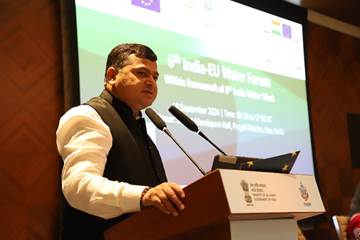India and the European Union (EU) agreed to enhance cooperation in sustainable water management at the 6th EU-India Water Forum held on the sidelines of the 8th India Water Week, in New Delhi today. Both sides committed to advance cooperation in river basin management, foster innovation and technology transfer, while promoting sustainable investments. The forum explored trilateral collaboration between East Africa, India and the EU, to address challenges in East Africa’s water bodies such as Lake Victoria and Lake Tanganyika, leveraging the combined strength of India and the EU.
The India-EU Water Partnership (IEWP), established in 2016, aims to enhance technological, scientific, and policy frameworks in water management. IEWP, currently in Phase III, focuses on creating impactful and sustainable solutions in key areas such as river basin management, climate resilience, urban flooding, and water governance.
Under IEWP, the EU and India are collaborating on river management on Tapi and Ramganga River Basins. Under Phase III, the partnership will extend its efforts to other key basins like the Brahmaputra. Both regions have co-jointly funded 7 research and innovation water projects with €37.4 million (EU €23.4 M + India €14 M), bringing together 743 participants from the EU and India. These projects focus on drinking water purification, wastewater treatment, and real-time monitoring and control systems, and the IEWP will further provide support for market uptake of these cutting-edge water technologies in India.
This high-impact forum bought together government representatives, policymakers, experts, and businesses from India and the EU to tackle critical water challenges and forge innovative technological solutions. Minister of State for Jal Shakti, Dr. Raj Bhushan Choudhary; Secretary (Jal Shakti), Smt. Debashree Mukherjee; Chairman, Central Water Commission, Shri Kushvinder Vohra; and Mr. Hervé Delphin, EU Ambassador to India, reaffirmed their shared commitment to water cooperation during the plenary session.
Dr. Raj Bhushan Choudhary lauded the partnership’s accomplishments and emphasized that the India-EU Water Partnership has contributed significantly to India’s water sector by supporting the strategies devised by the Ministry of Jal Shakti towards holistic management of water resources in India.

Mr. Hervé Delphin said, “the EU and Team-Europe are glad to join the 8th India Water Week and are hosting the 6th EU-India Water Forum today. Eight years of collaboration have shown us that when we share expertise, we can tackle even the most pressing water challenges. Team-Europe is eager to further deepen its partnership with India under the existing water cooperation framework. Today’s forum is a testimony to the growing ties”. Mr. Delphin added, “While we have developed a successful Partnership for solutions in India, we are keen to work together with Africa to bring our respective expertise and develop innovative water management and foster regional water security.”
The 6th EU-India Water Forum serves as a key platform for discussing water sector challenges, sharing best practices, and enhancing business and research opportunities. As India and the EU continue to advance their cooperation in water management, this forum reaffirms their commitment to achieving sustainable water resource management for future generations.
IEWP highlights the shared commitment between the EU and India to address global water issues through technological collaboration, policy exchange, and sustainable investment strategies. The current phase (Phase III) prioritises government and business partnerships, aligning with India’s National 2030 Agenda and the EU’s Global Gateway Strategy, which promotes sustainable investments, connectivity, and infrastructure development focused on green, digital, and inclusive growth. The India-EU Water Partnership is closely aligned with the United Nations Sustainable Development Goals (SDGs). In addition to contributing to SDG 6 and SDG 13, the partnership also supports SDG 15 (life on land) and SDG 11 (sustainable cities and communities) by promoting sustainable, green, and climate-resilient infrastructure. Through joint efforts, the partnership is committed to addressing global water challenges, while advancing the broader goals of environmental sustainability and resilience.
 Matribhumi Samachar English
Matribhumi Samachar English


